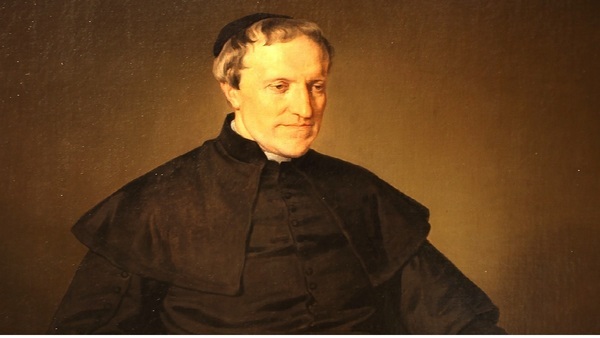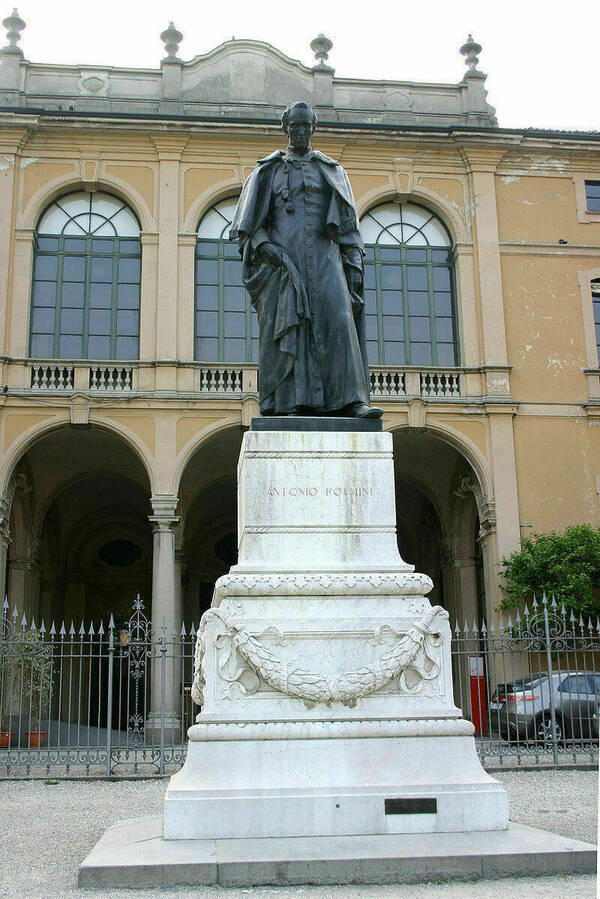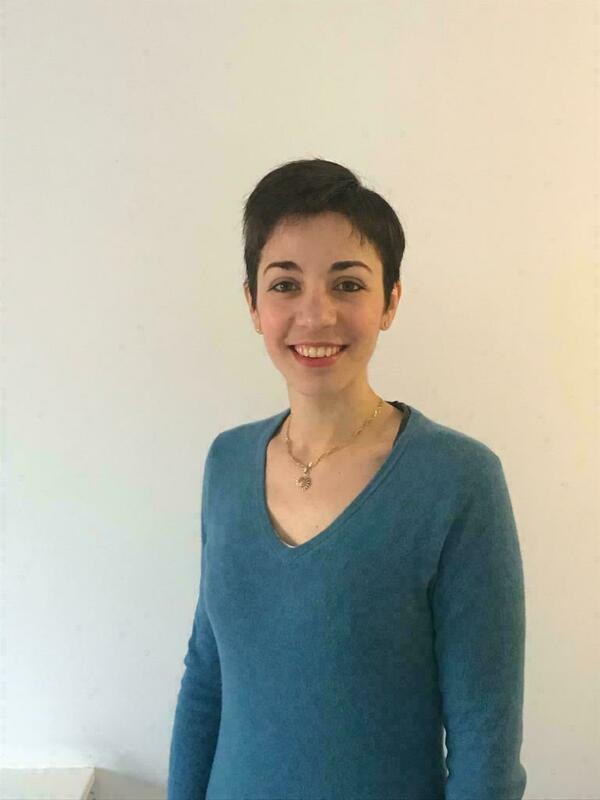
Antonio Rosmini is not well known in American philosophy, but he is a classic of Italian thought that still fascinates today. He was born in Rovereto in 1797 and died in Stresa in 1855. He devoted his entire life to writing a new encyclopedia of the whole human knowledge, to point out the flourishing of the esse (universal being) in its variety, and to show God’s closeness to humankind. He explored many different fields, and he wrote over ninety works on metaphysics, theology, art, biology, medicine, politics, pedagogy, and law. Moreover, he was involved in politics, trying to find a peaceful solution to the so-called Roman question. Again, Rosmini was a friend of Alessandro Manzoni, and suggested him The Bethrothed’s end. Thus, Rosmini was one of the most influential Italian intellectuals of the nineteenth century. His thought has been compared with that of Parmenides, Plato, Augustine, Thomas Aquinas, Kant, Schelling, and Hegel.
It is impossible to explain and analyze in a single work his philosophical system in its totality. This post focuses on the theme of nothingness and human contingency, comparing and contrasting them with the Rosminian concept of being. This choice was motivated by the fact that Rosmini scholars haven’t tackled this specific issue yet. Furthermore, contingency is a current theme today, not only in Academia but in our lives too.

In a nutshell, Rosmini’s contribution to the debate about nihil (nothingness) is twofold. First, he developed his concept of nothingness and contingence after structuring his theory of being. As a result, reading Rosmini’s works with a nihilistic perspective (a widespread approach in today’s metaphysics) is not precise. If on the one hand for him nothingness is the dialectical pole of the universal being, on the other he is also strongly interested in the finite entities. Second, the relation between the finite and the infinite is the neuralgic point of his major work on ontology, the Theosophy. This book explores and analyzes the different levels of being (i.e. how our finite thought can conceive of the being in itself, and how the entities participate in this being), as well as the dignity of the human person in relation to God, the omnipotent Creator of the universe.
For Rosmini, nothingness is neither the negation of the particular entity nor what he calls “the indeterminate esse” (universal being). The adjective “indeterminate” has confused his interpreters. Some of them wrongly read this being as synonymous with “nothing”. But this is not accurate. “Indeterminate being”, according to Rosmini, does not refer to a negative dimension, but on the contrary, to the purely positive, to the infinite splendor of being that will never cease to be. It is the infinitely possible and infinitely fertile being because it can always assume new particular entities. This being is “indeterminate” only in the sense that it is not a determinate and limited entity.
Therefore, according to Rosmini, absolute nothingness does not exist and cannot be given at the level of the ontological foundation of the contingent world. At most, it can be the affirmation of the lack of existence of an object, a limited entity, on the part of a thinking subject. However, such a “manifestation” of nothingness is not a form of ontological existence. It coincides exclusively with a linguistic use (nothingness manifests itself only in the word “nothing”) and with a gnoseological recognition (nothingness belongs to the level of the psychological dimension), which both define the non-existence of a thing, not the original esse. In other words, nothingness is not a “place” or dimension of our world. Nothing is nothing. We can speak about it only in comparison with an entity, when we say that something was, and now it is not present anymore. So the word “nothing” exists only in our mind and in our language, not somewhere outside these realities.
Consequently, he posited two relevant theses: Nothingness exists only as removed, so that it can exhibit itself only as an opposed pole to the initial being. Moreover, for Rosmini and the whole patristic and scholastic tradition, the expression “creatio ex nihilo” does not refer to hypothetical nothingness as the origin of entities. On the contrary, it indicates the total gratuitousness of the act of creation, as well as the entities’ abysmal lack of autonomy.
Therefore, it is necessary to understand in which sense a human being finds his dignity in his limits. The books of Theosophy and Theodicy tackle this very theme. Here, Rosmini distinguishes negation, limitation, and privation. He defines the first as a logical operation, which claims that something does not exist. The second does not deny an entity; on the contrary, it determines the essence of that entity. Finally, privation highlights what an entity should have according to its nature, for instance sight for a being with eyes. In sum, when our author defines finite entities as “limited” or “not infinite”, he does not intend to humiliate them but, on the contrary, to define their essence.
Suggested further reading:
- Manferdini, T., «Genesi e critica del nichilismo hegeliano secondo Rosmini», in edd. Beschin, G.;
Valle, A.; Zucal, S., Il pensiero di Antonio Rosmini a due secoli dalla nascita, vol. I, Brescia
Morcelliana, 1999, pp. 217-235. - Pagani, P., «L’essere iniziale nella Teosofia di Rosmini», Divus Thomas: Antonio Rosmini e la
filosofia, Giornale di metafisica, Vol. 42, No 2, (2020), pp. 505 – 523. - Peratoner, A., «L’ontologia trinitaria rosminiana come soluzione alla pensabilità del rapporto tra
Assoluto e finito», Divus Thomas, Vol. 123, No 2, (2020), pp. 82–105. - Raschini, M. A., Dialettica e poiesi nel pensiero di Rosmini, Collana del Dipartimento di studi sulla
storia del pensiero europeo «Michele Federico Sciacca,» Università di Genova 5, Venezia, Marsilio,
1996. - Rosmini, A., Teosofia, edd. M. A. Raschini - P. P. Ottonello, Roma, Stresa, Città nuova editrice,
1998-2002.
About the author

Lucia Bissoli is a Ph.D. candidate and a professor in humanities at Francisco de Vitoria University (Madrid). She began to study Rosmini’s philosophy during her master’s degree at the Catholic University of the Sacred Heart of Milan in 2013. In her first study on Rosmini, she tackled his political and juridical thought, with a focus on the theme of foreigners’ rights and duties. After graduation, Lucia Bissoli was involved in a one-year peace project called White Helmet of the Peace in Russia, working in a center for people with special needs. Between 2019 and 2020, she worked as a History and Philosophy Teacher at Gimnasio Alessandro Volta, an Italian high school in Bogotá, Colombia.
These experiences inspired her recent research on Rosmini’s metaphysics, with a focus on non-being and human limits. She has been a visiting fellow at the Jacques Maritain Center at Notre Dame University.